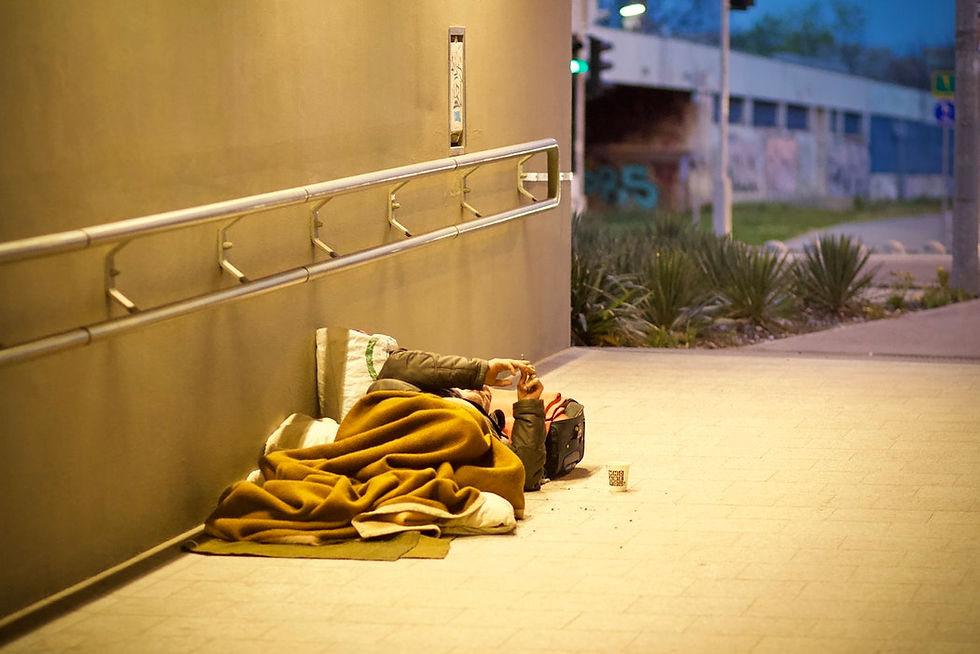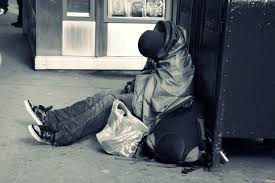“You’re just invisible when you’re homeless”: Can councils curb rough sleeping?
- Cameron Hayward
- Jan 17, 2019
- 6 min read

We’ve all seen them, lining our high streets, surrounded by litter, tapping passersby for their change. You may have given them the few coins weighing down your wallet, but chances are, you don’t give them a second thought. In a first world country like Great Britain, it’s not a position you ever imagine yourself in, but for more and more families every year, it’s a brutal and crushing reality, one that looms without warning. There are many reasons, influences and contributing factors that lead to a family or an individual becoming homeless, giving councils an insurmountable task, dealing with the issue of homelessness in Britain.
It’s no secret that the homeless situation in the UK is out of control. Walking through our major cities shows the extent of the problem, from overflowing temporary accommodation facilities, to the huddles of people crowded into stairways and underground footpaths when the temperature drops.The number of people sleeping rough in England hit a record-high at the start of 2018 after a 73 per cent increase over the previous three years.

Britain’s central government clearly understands there is a problem, introducing legislation just last year to continue to reduce the extent of the issue. But now that there are over 120,000 children classed as homeless, living in temporary accommodation such as hostels and bed and breakfasts, we are left to wonder if the state is really doing all it can to tackle the issue. Jay Hart, a head teacher and Crisis volunteer from Droitwich, says he knows the answer.
“The government and local authorities, they just don’t want to know and it hasn’t changed since I was on the streets of Fulham in 86. Something should have changed in 30 years”. Jay was homeless for a year and says the government didn’t offer any support while he was homeless. “I was assaulted by 6 blokes coming out of a night club. Just because they wanted to beat up a homeless person. I just woke up being beaten up, just about managed to drag myself to the hospital. I got visited while I was out there by a social services agent to look at my case, and I left hospital after 2 days and they never reappeared”.
Click here to see more of my interview with Jay
More than just social services, Jay says he was invisible to the police and even the average passerby. “You’re lost to society, the police don’t care, nobody cares, they walk past you as if you don’t exist. I was constantly moved on by police, the local authority just designates people to move the homeless, you’re a nuisance to everyone. The state simply doesn’t want to know homeless people, and I don’t think that’s changed, I really don’t.”

Councillor Peter Jeffries, Cabinet member for housing at Cheltenham borough council agrees that central government are clearly not doing enough. “They are the government, it’s their choice to do x, y and z with our housing budget. If they wanted to end homelessness, if they wanted to solve the housing crisis, they’ve got the power to do it.” Cllr Jeffries says, despite many government pledges, the state simply lacks the will to do something significant about our homeless problem. “I bare no compassion to the government on this matter what so ever, if they were committed to it, they would do it.” Instead, the responsibility of dealing with rough sleeping falls on local authorities, who lack the power and the funding to end homelessness.
Councils have frequently been criticised for their tactics in dealing with rough sleeping. Bournemouth borough council came under fire in 2016 for buying one-way train tickets for the homeless, effectively displacing the problem. Speaking to Caroline Sutcliffe of the housing strategy team at Cheltenham borough council, I was able to find out the kinds of things councils do to get the homeless back on their feet.
“In Cheltenham, we have a service called ‘ACTion Glos’ which is a county partnership with the 5 other district councils within the county, Gloucestershire County Council and the NHS Gloucestershire Clinical Commissioning Group which is a result of securing £990,000 of government funding as part of the Entrenched Rough Sleeping Social Impact Bond Funding and offers support to individuals entrenched within the homelessness system.”. These council provided services rely on government funding in order to succeed. Thanks to a recent “Homelessness reduction act” introduced in April last year, local authorities now have more at their disposal in order to help those in immediate risk of becoming homeless.

The problem is that legislation like this only scratches the surface of the issue, one that Councillor Peter Jeffries, cabinet member for housing at Cheltenham borough council, says the government could easily solve. “’affordable homes’ as they call them, are only affordable if you can afford to pay the rent… for me, affordability needs to be linked to earnings, not house prices, and that is a structural nature the government could change in the system.”
Becoming homeless in the first place can happen incredibly quickly, and from many contributing factors. According to the housing strategy team at Cheltenham borough council, it comes down to just a few major points. “The 3 main reasons for homelessness in Cheltenham are the issuing of s21 notices to leave accommodation in the private rented sector, domestic abuse and people being asked to leave accommodation where they have been staying with family and friends.”
Jay himself admits that he became homeless because of trouble at home, when at 16 years old, an argument with his father left him on the streets. All this makes the government pledge to end rough sleeping by 2027 hard to accomplish for local authorities. As Mrs Sutcliffe says, “the issues and challenges surrounding homelessness are numerous and complex and varies from challenges in finding appropriate safe accommodation to ensuring the health and support needs of people who are homeless are met and that people are given appropriate support to access alternative accommodation”. But since the homeless population is ever increasing, and the route causes of homelessness cant easily be regulated by the state, is completely eliminating rough sleeping within just one decade unrealistic?

Many believe the government should be less interested in targets and more on directing funding. Cllr Jeffries also believes these targets are less than they appear, saying “Whilst I’d want to say yes I’d love the government to end rough sleeping by 2027 or whenever it was, that’s just another target, another gimmick, another headline.” With each new government promising to build more council houses, people are given a skewed idea of what is needed to end homelessness. “You give people a false perception that you’re going to solve the problem, when in actual fact, you can’t turn a housing supply on and off like a tap.”
The housing first model is an approach used by the government to help those entrenched in homelessness find stable accommodation, not just through housing solutions, but lifestyle management and emotional support. Cllr Jeffries believes this is the best approach, “What they’re doing with the housing first model is correct. What they’re saying is, it’s not about the house, let’s look at you as a person. Whether you are addicted to alcohol or drugs, whether you have mental health issues, whether it is just a housing issue for you, or any other issue in your life that is a barrier to you attaining accommodation, that’s what the housing first model tries to solve.”
Given more funding, councils could follow this model nationally, making homelessness much less of a problem, if a problem at all. “It’s not enough funding, it works out to about 43 pence per person a day for four years. So, it’s not enough funding, they need to reinforce that funding, and make it national.”
“you're living in one of the richest countries in the world, people are comfortable, people are well off and there is a whole group of people who are the damned. They have nothing, no one and no hope and I know it hasn’t changed” - Jay Hart
In the end, the homeless problem isn’t something councils can solve on their own. A problem that is still not considered a national emergency despite claiming the lives of over 400 people last year, homelessness is everyone's responsibility. As Jay himself says, “Ordinary people who aren’t homeless are your biggest enemy because they treat you like crap, they think your nothing and nobody.”. Perhaps if we all took notice, the government would have more intensive to exercise their powers to end homelessness. The biggest issue of all might be the fact that, as Jay puts it, “nobody wants to take responsibility for the most vulnerable section of the population”








Comments